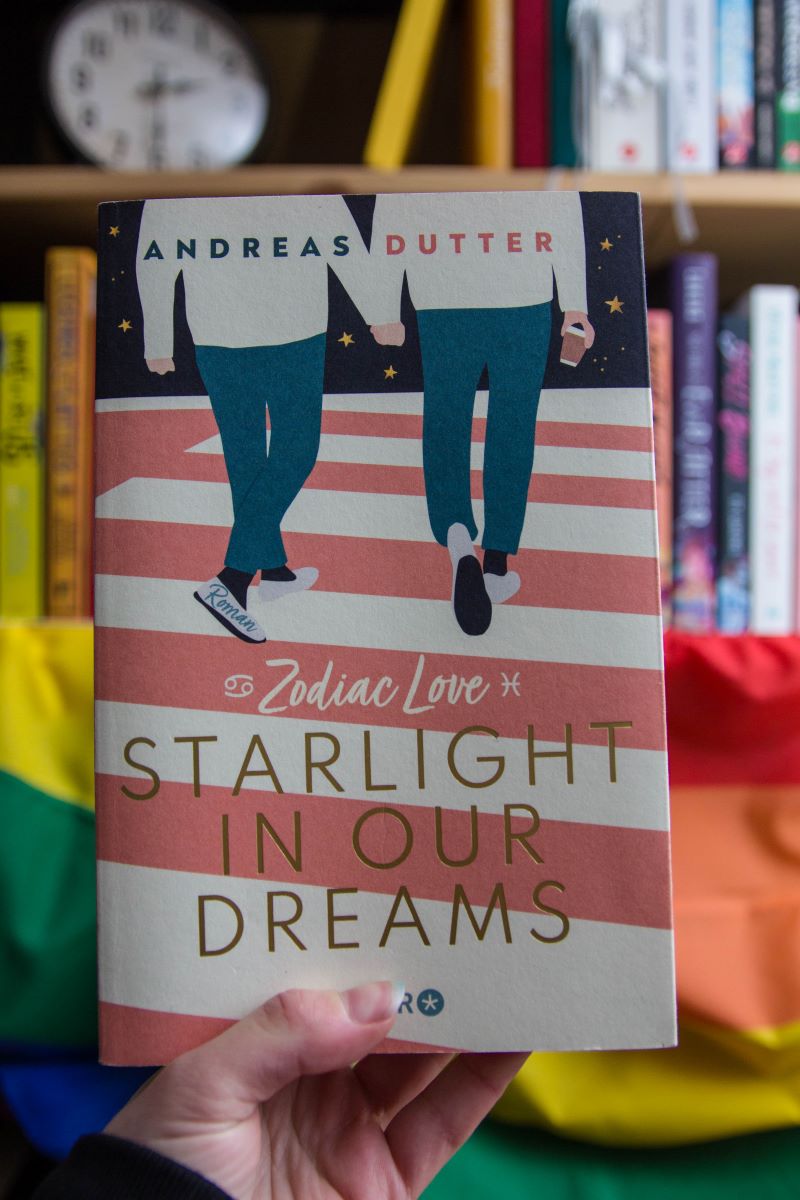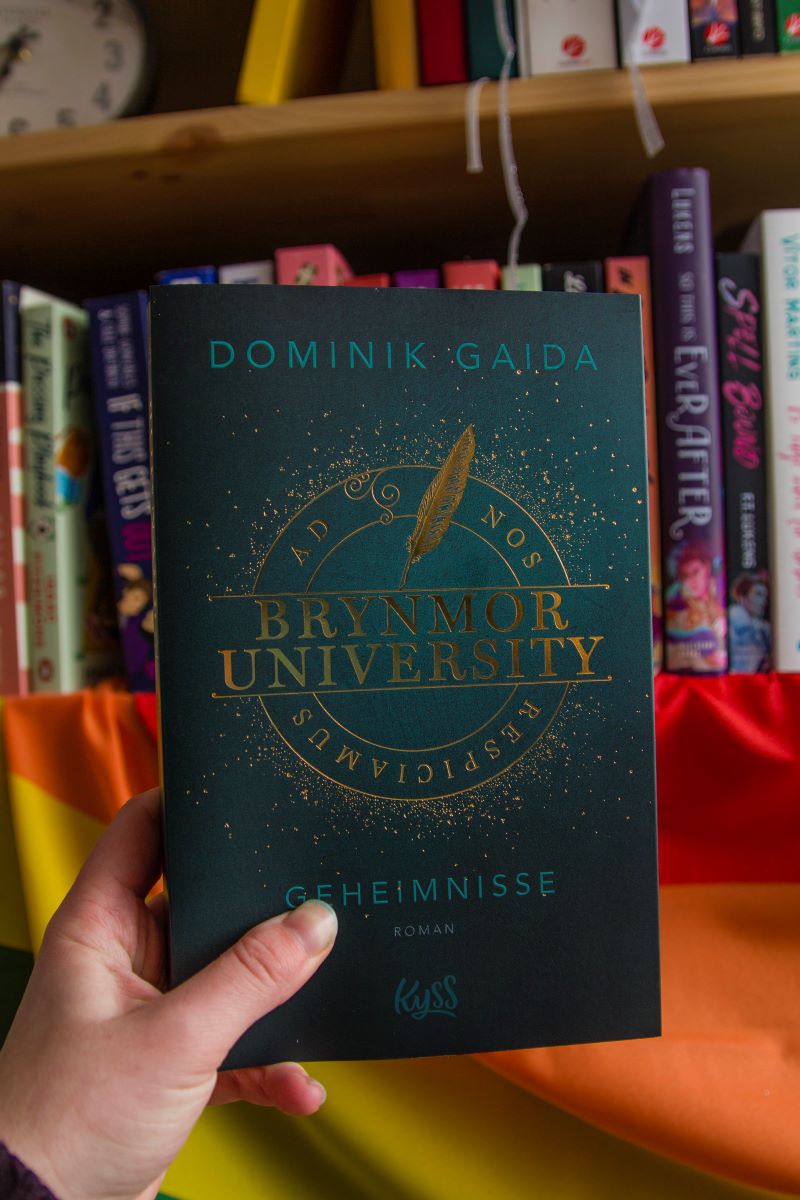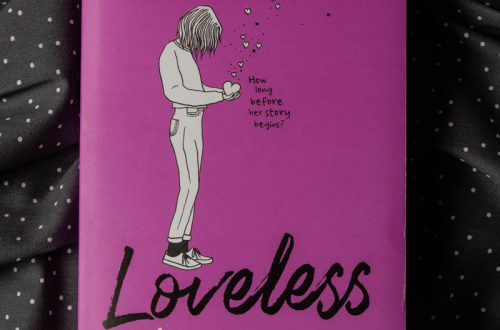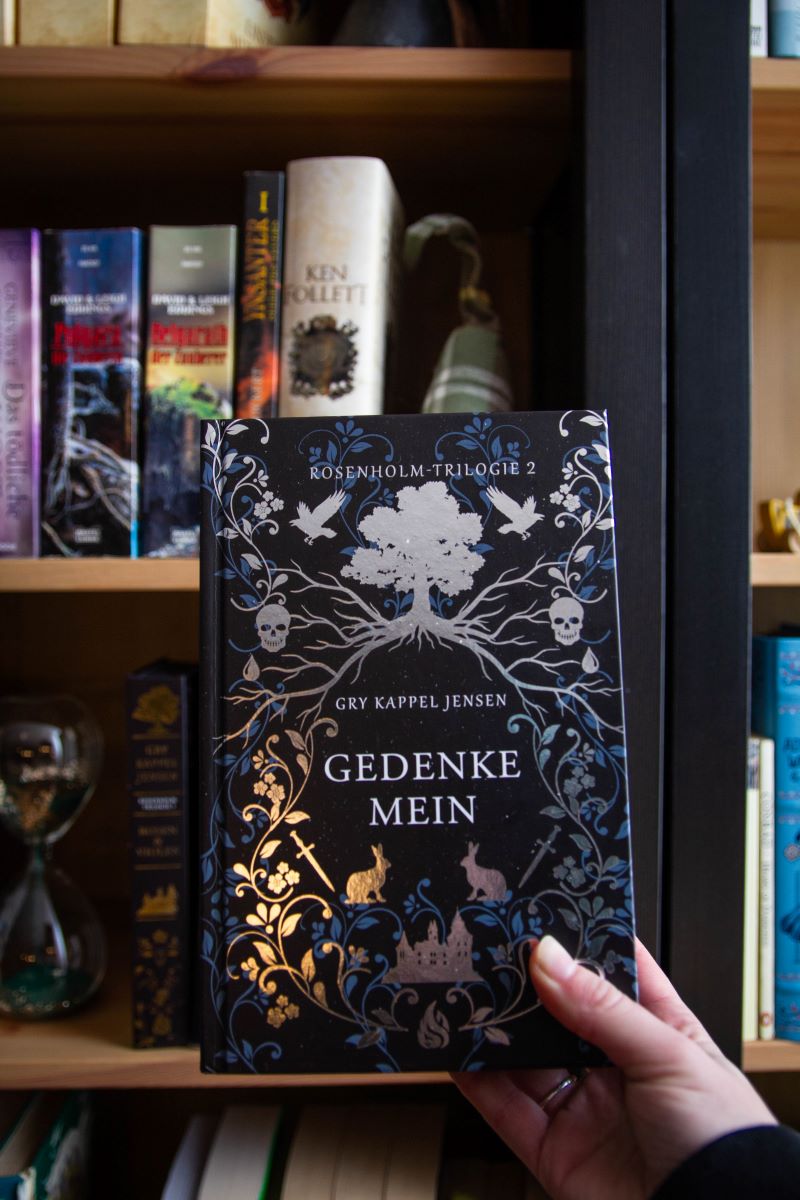
Book review: Andreas Dutter – Starlight in our Dreams
This book is the first part of the Zodiac Love series – a cozy queer trilogy about love and astrology. The books were written by the Austrian author Andreas Dutter – and I honestly have no idea if they were translated into English. For once it’s good to be German. I’ll still write the review in English – who knows, if it hasn’t happened yet … maybe the books get translated one day.
Short info: MLM romance, gay author, trans character
Let’s start with a quick summary of the plot: Felix, a young man from rural Austria, moves to Cork for his studies. A big step, as he’s generally a rather shy, insecure young man who is highly influenced by a) his belief in Astrology and the fact that his identity is determined by him being Pisces and b) his childhood in an Austrian village, where people weren’t exactly accepting towards his sexuality. In Cork, he tries to start a new life. He moves in with a girl, Cara, he met online who is just as much (if not even more) into Astrology as he is, and takes up Cultural Studies at the UCC. Right at the beginning, he meets Owen – a guy who seems cold on the outside, but turns out to have a very soft core. In contrast to Felix, Owen deoesn’t believe in Astrology at all. So they start a bet: Felix and Cara will pick dates for Owen and, based on their natal chart, will determine how these dates will end. Owen agrees – and chaos enfolds.
Basically, the story sounded cozy and so much like a feelgood-story that I was more than excited to read it. Several times when it was time for me to pick a new book, I was close to choosing this one. Yet, it took me quite a while until I finally picked it from the shelf. And well, first of all: Yes, it is a cozy feelgood-story. Nevertheless, there are a few content notes to keep in mind. The author included a list of those at the end of the book. Topics that are touched in this story include – as you can assume from the short summary at the top – homophobia / queerphobia, but also anxiety, loss of loved ones and dealing with disease (in that case Parkinson’s and dementia). All of that is tied in in a sensitive way that adds to the plot and the characters and makes perfect sense. It’s not just there to create drama, but is crucial to the story and the character development.
Speaking of the characters, I personally think that the majority of the characters in the book are sympathetic and very likeable – even Owen, who might seem a bit insensitive and asshole-ish in the beginning. The story is written in alterning POVs, switching between Felix and Owen and while Owen might sometimes seem like a massive prick, the parts written from his perspective usually provide understanding for this thoughts and actions. Yet, I also have to say that in some aspects, I found that the characters are way too stereotypical, predictable and sometimes even a bit flat. But well, this book is based on astrology and especially Felix tends to explain every damn behaviour with people’s zodiac and their natal charts, so I shouldn’t have been surprised by shallow, stereotypical characters. A core aspect of the book IS Felix blaming his zodiac sign for the way he is . Not that I’d know what Pisces are like, I’m a very stereotypical Cancer in every aspect. So in fact, there is a good excuse for the slightly stereotypical characters.
Also, some aspects about the story gave me strong BookTok (or even Wattpad)-vibes. I admit: I used to be a fanfiction reader and author (… I still consider myself a fanfiction author, I just stopped publishing) and when I say „this reads like fanfiction“ it’s not necessarily a bad thing. But in this case, there just were these moments and .. well … aspects that made me think „feels like fanfiction“ in a rather negative sense. For example there’s a tiny story about one side character (I’m not sure if it was Cara or Roisin, Owen’s best friend) at a One Directions concert that made me roll my eyes because come on, what was described there ONLY happens in fanfictions. Also even I as an avid music lover and nerd can’t really take much out of excessive use of song titles and music references in a book (okay, probably I’d be more delighted if it was a genre I listen to, but … nah, honestly I don’t think so.) But this is not necessarily criticism, this is based on personal preference. Someone else (and possibly especially younger readers – I’m 30+ after all) might find especially those parts delightful.
And another aspect I struggled with was the language. Now I am a) a bit of a perfectionist and b) an English teacher. Which doesn’t mean I’m perfect, but stuff like the following annoys me: The book is set in Cork, Ireland, yet the language used didn’t make the impression as if the author put a lot of focus onto what is possible in English. One thing that stood out for example was that the author frequently dropped the subject in a sentence and simply started with the verb. Which irked me in more than one sense. I don’t like that in German – and in some cases, it absolutely didn’t work when my brain translated these sentences into English. It irked me so much that I found myself googling the Cork accent to find out if that’s something people in Cork might do. What I learned is that I don’t really understand the Cork accent, but I couldn’t find traces of this being a specific Cork thing. My next idea was that this might be a specific Austrian-German thing. In the end I don’t know what it is – but it irked me. (Like honestly, while I’ve been working on the *perfect* book plot for me personally, one reason why I will probably never publish it is that it’s set in two different times in Scotland and France and I don’t ever want any linguist to point a finger at me and tell me „BUT THIS DOESN’T WORK AT THAT TIME IN THAT LANGUAGE!“)
And once again, I guess this is not necessarily criticism but just a very personal view.
So all in all, while reading the book, I found myself pulling my hair, moaning and rolling my eyes quite a few times and I often complained while reading that „this is so stereotypical“, „this was so predictable“, „I don’t understand why he does that weird subject-omission-thing here“ etc. etc.
BUT. I still liked the book. Especially towards the end I had an easier time to ignore what I didn’t quite like. It had the right amount of idiots-to-lovers energy for me to be absolutely satisfying (I’m a sucker for idiots-to-lovers). Despite the serious contents, the book made me feel cozy – and I think I really want to visit Cork now. I felt entertained, I felt with Felix and Owen and I will, despite my struggles with the book, read the second part as well. Not sure about the third, but well – I don’t need to rush through 🙂
Edit (28 December 2023): Yesterday I suddenly remembered another thing that bugged me while reading this book: Dialogues. Writing realistic dialogue is difficult and I personally didn’t like the way Andreas Dutter did it in this book. Quite often, during a conversation, one of his characters would say multiple things and ask multiple questions and then the other character would reply and work through that list of topics. For me, that doesn’t feel very natural – more like responding to someone’s voice mail on WhatsApp. „I’m trying to remember all the things you said and asked and then will try to respond to them in the correct order.“ But this is not how people in real life would talk, at least in my own perception. People would possibly interrupt each other, wait for their collocutor to reply to a question, people would probably ditch certain topics and just move on with the conversation (as a socially awkward person, I know the feeling all to well of either not knowing when it’s my turn to speak and waiting endlessly until I can no longer add my opinion to a certain topic because the conversation has moved on … or seeming rude as fuck because I interrupted someone because I desperately NEEDED to add my five cents to a certain topic).
The second problem I have with this way of writing conversation is that it might sometimes confuse the reader because it’s unclear which reply belongs to which question. Sometimes I’d be totally confused because the reply mismatched the question and then I noticed that the character was replying to something that had been said at the beginning of the other character’s part of the conversation – something I had forgotten until then. I have the attention span of a freshly hatched chick, don’t expect me to remember what somebody said at the beginning of a several minutes long monologue until it’s finally my turn to reply. I will most likely remember their last question, not much more. When I listen to voice mails (I HATE THEM!) I have to take notes to be able to remember what I have to reply, otherwise I will just miss out on the most important shit that was hidden somewhere in the middle of a 3-minute-message.
So tldr: I didn’t like the way dialogue was written.
As a hobby author by the way, I had an interesting conversation on writing dialogue with a fellow writer from a different country with a slightly different cultural background – maybe I’ll elaborate on that in a different post. If I find the time, motivation and guts to write something about writing.



